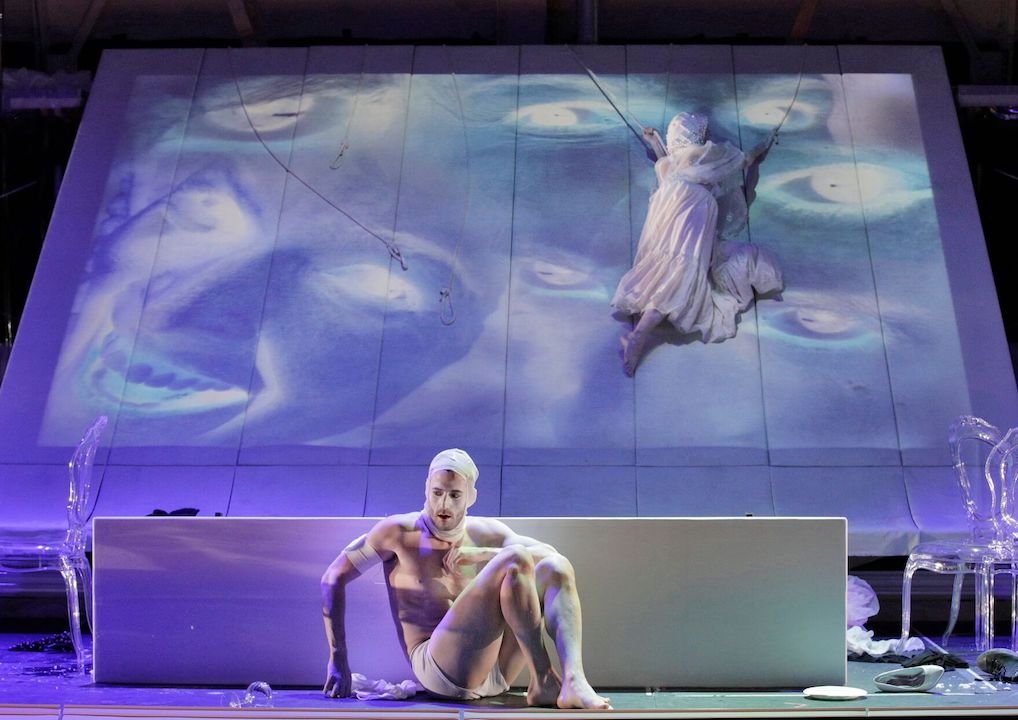Beginning their 2018 Festival with Debussy’s only opera, a love triangle sketched in delicate sensuality, West Edge Opera closed its summer offerings with Luca Francesconi’s Quartett, an operatic staging of Heiner Muller’s 1982 play of the same name, both inspired by Laclos’ 18th-century novel, Les liaisons dangereuses. Very different fare.
There are crucial similarities, however, not only the operas’ focus on love and sexuality, suppressed or distorted, but more covertly and importantly, in the violence created by the claustrophobia imposed by lovers’ shared passion. While the passion of Pelléas and Melisande is innocence, in Quartett, the lovers’ passion is depravity.

There are only two singers in Francesconi’s opera, the Marquise de Merteuil, sung by soprano Heather Buck, and the Viscount de Valmont, sung by baritone Hadleigh Adams. Both singers navigated this demanding score effortlessly and intensely; neither distracted by the acting required to portray these desperately immoral and sly characters.
Clearly, there is past between these decadent 18th-century aristocrats, and a present that is vicious and unrelentingly demanding. Its violence is embodied in two other characters that the Marquise and Valmont role-play for each other, assuming the personas of the teenage convent-bred Cécile de Volanges and the religious Mme. de Tourvel. Seduction is the game, as the Marquise pushes Valmont into pursuit. And death is the prize.
Francesconi’s music is divided into a chamber ensemble playing at the front of the house, representative of the jagged interplay between the Marquise and Valmont, and recorded large orchestra and chorus, representing the outer world projected like an otherworldly presence above the stage. Originally, the second orchestra was conceived as a live orchestra behind the stage; it has since become more effectively electronic, creating a polyphonic, multimedia sound world. Strikingly, the Festival Orchestra under the baton of John Kennedy, the Spoleto Festival resident conductor who directed the opera’s US premier, blended seamlessly with the electronic music created for the opera’s La Scala premiere.
Francesconi wrote the libretto in English, eschewing both Italian and German, for the “Esperanto” of the day.
The production is immensely enhanced by Elkhanah Pulitzer’s savvy directing. She seems to be the company’s go-to director for transgressive sexuality, having directed West Edge Opera’s productions of Berg’s Lulu and Ádes’ Powder Her Face. And she handles transgression with enviable aplomb, making the dark, in-your-face sex look as casual and normal as eating a peanut butter and jelly sandwich. Every chaotic gesture of sexual preoccupation seems perfectly natural in Quartett, and Buck and Adams seem thoroughly at ease with their characters’ obsessions, whether dressed in nothing but their knickers or in bizarre fantasy outfits. The intriguing costumes were designed by Christine Crook.
The set, designed by Chad Owens, is divided into five parts. The stage space is divided by a huge tilted plane above the main stage. To either side of that stage are two areas suggesting showers, and above them, on either side of the top edge of the tilted plane are two “dressing rooms”. The Marquise inhabits one side and Valmont the other. Both characters slide down the tilted plane from their dressing rooms to the main stage, where a dining room table with candelabras and elegantly transparent chairs are arranged.
Eerie and enormous portraits of the characters, in colorized negatives projects lit up the central plane, underlining the shadowy narcissism that drives the duo’s perversion. Projections were by Jeremy Knight, and offered a dark flip side to the ghostly face and body makeup provided by Jolie O’Dell.
Bizarre, extreme, fascinating. Quartett concludes what is West Edge Opera’s most engaging and skillful season yet, showing how adventurous and innovative the company has become. As Berkeley Opera it was always interesting, but over the past few years it has polished its productions, raised the level of its performers, encompassed a broader repertoire and provided a worthy company for young and fresh opera talent in every aspect of production.
– Jaime Robles
The 2018 West Edge Opera Festival continues through August 19. For information and tickets, visit westedgeopera.org.
